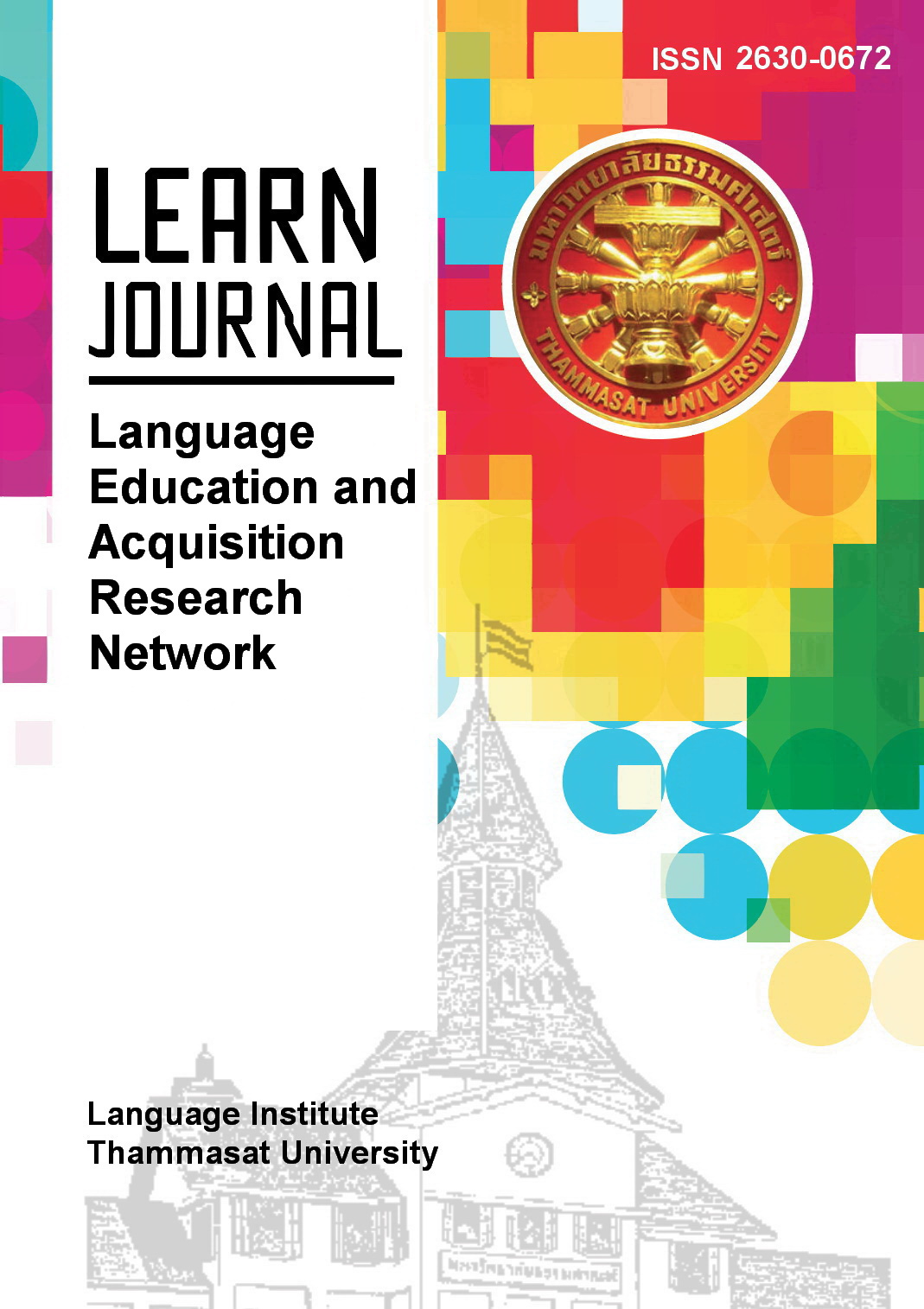A Diachronic Analysis of Prospect Theory in the Thai Online News during the COVID-19 Pandemic: A Corpus-Driven Study
Main Article Content
Abstract
This study aims to investigate the linguistic strategies used in public health communication during the COVID-19 pandemic, according to the regulations stipulated by the Center for COVID-19 Situation Administration (CCSA) of Thailand. A corpus of 1.4 million words was retrieved from Thai online mainstream news media written in Thai, and systematically randomized to analyze news content from March 1, 2020, to December 31, 2021. The framework used for analyzing language was the prospect theory, also known as the message-framing effects. This theory refers to choices that are framed or conditioned by language codes that manipulate changes in people's behaviors. Sentences or clauses designated as “one cause” and “one effect” were analyzed based on syntactic criteria, such as causative construction. The framing effect can be divided into two groups: the effect framed by GAIN (positive result) and its counterpart, LOSS (negative result). It was found that the most favorable linguistic strategy was “GAIN” (63%), reflecting positive messages. Based on linguistic evidence, it appears that Thai conventional media convey positive messages, which encompass prevention, risk-aversion, and positive attitude cultivation. The use of gain-framed language devices by agencies may reflect their attempts to generate positive emotions and gain people's trust during stressful situations, as well as to express sympathy and politely respond to the audiences. All things considered, the use of gain-framed-message strategies in Thailand plays a role in pandemic management and protection, contributing to the highly acclaimed and effective public health system it has accorded.
Article Details
References
Adolphs, S., McAuley, D., Vilar-Lluch, S., Knight, D., McClaughlin, E., Nichele, E., Lang, A. (2023). Communicating health threats: Linguistic evidence for effective public health messaging during the Covid-19 pandemic. Nottingham: University of Nottingham.
Akl, E. A., Oxman, A. D., Herrin, J., Vist, G. E., Terrenato, I., Sperati, F., & Schünemann, H. (2011). Framing of health information messages. Cochrane Database of Systematic Reviews, 7(12). doi: 10.1002/14651858.CD006777.pub2. PMID: 22161408.
Alhabash, S., Almutairi, N., & Rub, M. A. (2017). Just add a verse from the Quran: effects of religious rhetoric in gain-and Loss-Framed Anti-Alcohol messages with a Palestinian sample. Journal of religion and health, 56(5), 1628-1643.
Banks, S. M., Salovey, P., Greener, S., Rothman, A. J., Moyer, A., Beauvais, J., & Epel, E. (1995). The effects of message framing on mammography utilization. Health Psychol, 14(2), 178-184. doi:10.1037//0278-6133.14.2.178
Beeney, L. J., & Fynes-Clinton, E. J. (2019). The language of diabetes complications: communication and framing of risk messages in North American and Australasian diabetes-specific media. Clinical Diabetes, 37(2), 116-123.
Chertow, D., Stein, S., Ramelli, S., Grazioli, A., Chung, J.-Y., Singh, M., Ylaya, K. (2021). SARS-CoV-2 infection and persistence throughout the human body and brain. Reseach Square. https://doi.org/10.21203/rs.3.rs-1139035/v1.
Chien, Y.-H., & Chang, W.-T. (2015). Effects of message framing and exemplars on promoting organ donation. Psychological Reports, 117(3), 692-702.
Cna. (2021, April 5). Thailand confirms COVID-19 outbreak in nightspots, prison. CNA. https://www.channelnewsasia.com/asia/thailand-confirms-covid-19-outbreak-nightspots-prison-196161
Gregory, A. (2023, May 5). Covid-19 is no longer a global health emergency, says WHO. The Guardian. https://www.theguardian.com/world/2023/may/05/covid-19-no-longer-global-health-emergency-world-health-organization#:~:text=The%20Covid%2D19%20pandemic%2C%20which,World%20Health%20Organization%20has%20said.
Hart, R. (2021, December 10). Trump’s ‘Chinese virus’ Tweet helped fuel antiAsian hate on Twitter, study finds. Forbes. https://www.forbes.com/sites/roberthart/2021/03/19/trumps-chinese-virus-tweet-helped-fuel-anti-asian-hate-on-twitter-study-finds/?sh=42f73d391a7c
Healthiest-countries 2023. (2023, January 16). Top 10 Healthiest Countries in the World (2021 Global Health Security Index). https://worldpopulationreview.com/country-rankings/healthiest-countries
Iwasaki, S. (1998). Causative and benefactive constructions in Thai. Paper presented at the Fifth Annual Meeting of the Southeast Asian Linguistics Society.
Iwasaki, S., & Horie, I. P. (2005). A reference grammar of Thai. Cambridge University Press.
Joseph, A. (2018, November 27). The framing effect. https://www.linkedin.com/pulse/framing-effect-ari-joseph-esq-?trk=portfolio_article-card_title
Kühberger, A. (1998). The influence of framing on risky decisions: A meta-analysis. Organizational behavior and human decision processes, 75(1), 23-55.
Lakoff, G., & Johnson, M. (1980). Conceptual metaphor in everyday language. The journal of Philosophy, 77(8), 453-486.
Maryville University. (2021, April 10). What is mainstream media? https://online.maryville.edu/blog/what-is-mainstream-media/
Mays, D., & Evans, W. D. (2017). The effects of gain-, loss-, and balanced-framed messages for preventing indoor tanning among young adult women. Journal of health communication, 22(7), 604-611.
O'Keefe, D. J., & Jensen, J. D. (2009). The relative persuasiveness of gain-framed and loss-framed messages for encouraging disease detection behaviors: A meta-analytic review. Journal of Communication, 59(2), 296-316.
Prasithrathsint, A. et al. (2010). Pan-dialectal Grammar of Thai. Basic research supported by Thailand Research Fund (TRF).
Rabin, M. (2000). Risk aversion and expected-utility theory: A calibration theorem Econometrica, 68(5), 1281-1292.
Rajatanavin, N., Tuangratananon, T., Suphanchaimat, R., & Tangcharoensathien, V. (2021). Responding to the COVID-19 second wave in Thailand by diversifying and adapting lessons from the first wave. BMJ global health, 6(7), 1-9. e006178.https://gh.bmj.com/content/6/7/e006178
Rayson, P. (2008). From key words to key semantic domains. International Journal of Corpus Linguistics, 13(4), 519-549.
Roberts, K. M. (2022). Performing Crisis? Trump, Populism and the GOP in the Age of COVID-19. Government and Opposition, 1-19.
Sampsel, L. J. (2018). Voyant Tools. Music Reference Services Quarterly, 21(3), 153-157. doi:10.1080/10588167.2018.1496754
Schneider, S. L., Levin, I. P., & Gaeth, G. (1995, November). The three faces of framing: a typology of framing effects. In 36th annual meeting of the Psychonomic Society. Los Angeles.
ThaiHealth (2020, March 14). Thailand health system praised as up to world-class standard. https://en.thaihealth.or.th/Infographics/293/Thailand%20health%20system%20praised%20as%20up%20to%20world-class%20standard#:~:text=ThaiHealth%20%E2%80%93%20Thail%20Health%20Report%202020,most%20prepared%20for%20a%20pandemic.
The Nation Thailand. (2022, May 26). WHO to use Thailand's efforts in combating Covid as a role model. https://www.nationthailand.com/in-focus/40015941
Tversky, A., & Kahneman, D. (1981). The Framing of Decisions and the Psychology of Choice. Science, 211(4481), 453-458. doi:doi:10.1126/science.7455683
Wong, T. (2020, May 12). Coronavirus: Why some countries wear face masks and others don't. BBC. https://www.bbc.com/news/world-52015486
World Health Organization. (2020, February 11). Naming the coronavirus disease (COVID-19) and the virus that causes it. https://www.who.int/emergencies/diseases/novel-coronavirus-2019/technical-guidance/naming-the-coronavirus-disease-(covid-2019)-and-the-virus-that-causes-it
World Health Organization. (2023, April 27). Confirmed cases of the COVID-19 and deaths reported to WHO. https://covid19.who.int/region/searo/country/th


